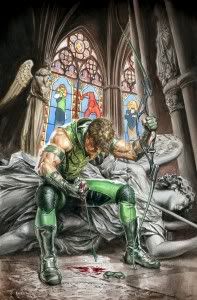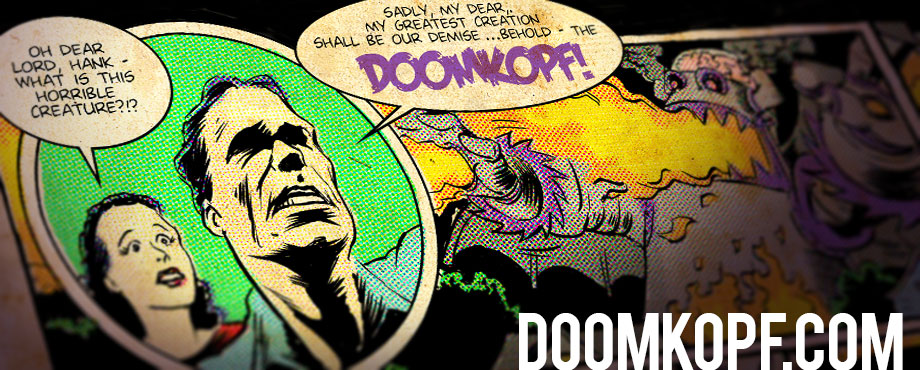Morality in the DC Universe
 If there is one moral to be learned in the conclusion to Justice League: Cry for Justice as it segues into The Fall of Green Arrow, it is that heroes don’t kill bad guys. Even if they feel justified, killing is murder. This sentiment alone is driving a significant status quo shift in the DCU — Connor considers his father a murderer, and Green Arrow’s Justice League teammates think he’s crossed a line that has led one of the Flashes (I honestly don’t know how I’m supposed to tell them apart) to unload on him, going on about how disgusted he is by Green Arrow’s decision to kill Prometheus.
If there is one moral to be learned in the conclusion to Justice League: Cry for Justice as it segues into The Fall of Green Arrow, it is that heroes don’t kill bad guys. Even if they feel justified, killing is murder. This sentiment alone is driving a significant status quo shift in the DCU — Connor considers his father a murderer, and Green Arrow’s Justice League teammates think he’s crossed a line that has led one of the Flashes (I honestly don’t know how I’m supposed to tell them apart) to unload on him, going on about how disgusted he is by Green Arrow’s decision to kill Prometheus.
So, to restate: Good guys don’t kill people.
Given that this concept has to have been getting heavy rotation in the brains of DC editorial as these events were being shaped and promoted, it makes the abomination that was Crisis on Two Earths that much more unforgivable.
This is a company whose commodities are heroes. How can these people so recklessly muddy the definition of heroism within their own properties?
And then take a step back and look at how the company’s superhero morality is made ambiguous: it’s unacceptable for heroes to kill people in the comics, which are largely purchased by an increasingly aging and maturing audience; on the other hand, nobody bats an eye when a hero kills two people in the cartoons designed for children.

I’m just reading a George Lakoff book about morality as conceptual framework. There’s some interesting stuff about our concept of morality as finance, with credits and debits, and language like, “I’m going to pay you back.” It’s neat stuff, but it doesn’t help me understand at all what DC is doing.
Believe it or not, I’m of the belief that it makes sense for superheroes to kill. I’m 100% against the death penalty in real life, but the world in comics operates under different rules. In real life, if some gets sent away to prison for life, they’re in prison for life. In the comic book world, they’ll inevitably break out and harm more innocent lives; that’s just the way it works there.
Now I’m not saying goons like The Ventriloquist and Mandrill deserve to be executed instead of being sent to maximum security, but it makes sense for the more dangerous guys like the Joker, Deathstroke, Carnage, Bullseye, and yes, Prometheus. These men kill for fun, and as soon as they get out of prison, they’re going to do it again. It’s not a matter of if, it’s a matter of when.
Take, for example, when Wonder Woman killed Maxwell Lord. With a brainwashed Superman under his control, Lord was the most dangerous man on Earth. If Wonder Woman hadn’t killed Lord, Superman would have killed her, and then he would have moved onto the rest of the superhero population. Locking Lord up in prison wasn’t going to do it. Sometimes murder is justified in the comic book world, it’s as simple as that.
BTW, Invincible has been exploring the idea of the morality of killing supervillains in a comic book world for about the last two years or so, and it’s been amazing. I highly recommend it.
I’m not saying there isn’t an honest argument for lethal force (though I disagree). What I’m saying is that DC has established two conflicting sets of heroic morals for its iconic characters, and that moral ambiguity is problematic when your business is selling heroes.
I’m not sure I get all the indignation over “Crisis on 2 Earths.”
This is kind of a technicality, but Johnny Quick didn’t actually die, he just sort of closed his eyes. It’s implied, yes, but not stated. I also think it’s worth pointing out that while Batman knew a speedster would “burn himself out” keeping a portal open to the multiverse, that’s not the same thing as knowing it would kill him.
As for Owlman, he was just stuck in a situation of his own making (actually, with a bomb of his own making). Batman didn’t kill him, he just sent him somewhere where he couldn’t destroy all of reality. Again – implied/likely death is not the same thing as killing someone.
Also, I think Owlman’s motives were perfectly clear – he’s a nihlist. The only difference between him and Darkseid or Thanos is his mortality, otherwise he’s pretty much working from the same motivation and towards the same goal – annihilation.
Didn’t Batman physically restrain Owlman to the bomb? He could’ve just stranded him in limbo, but he chose to make him explode. I’m still going to mark that in the “Kill” category.
And with all due respect, I feel like you’re kind of grasping at straws to explain away Batman’s killing of Johnny Quick. One could very easily accomplish the same thing, stay true to the characters and introduce no ethical dilemma. Off the top of my head:
BATMAN: The only way we can follow Owlman is if we can find a way to create vibrations at 80 zillion jiggywobbles —
FLASH: I can vibrate at 80 zillion jiggywobbles!
BATMAN: No, I can’t let you do that. Moving that fast — even for just a few minutes — could kill you, Flash.
FLASH: But Batman, I —
BATMAN: We’ll find another way.
JOHNNY QUICK: I’ll do it.
FLASH: But you heard Batman — it’ll kill you!
JOHNNY QUICK: No — it *could* kill me.
And then Johnny Quick could give a little speech about finally doing something to help someone, blah blah. He could even throw in a cocky (but knowing) dig at the Flash about doing a better job too. Look at that — no ethical problems, kept Batman as the somewhat patronizing know-it-all, kept Flash earnest and compassionate, and redeemed Johnny Quick. It’s a completely uncomplicated scenario that took me all of five seconds of thinking.
Also, for what it’s worth, we weren’t the only ones who thought Batman killed people. When I finished watching this awful movie, I looked at its IMDB score and saw that it was pretty high. One of the external reviews they linked to had this to say:
All valid points. It didn’t really bother me, to be honest – in Owlman’s case, it seemed totally appropriate. 😎
I like the alternate dialogue for Johnny Quick, though – it’s always nice to see a villian redeem himself.